“If you wanted to live a nice, quiet, peaceful life, you picked the wrong time to get born.”
The Phoenician Scheme will be releasing in just a few days, so before Wes Anderson discussion ramps up once again and Film Twitter tries to convince you his movies are bad, I’d like to bring your attention to the film I consider to be his magnum opus — Asteroid City.
When people talk about Anderson’s best films, the common consensus seems to be somewhere between The Royal Tenenbaums, Fantastic Mr. Fox, and The Grand Budapest Hotel. While I love all three of those films, I think a strong case can be made for Asteroid City being his most elaborate and existential, and therefore, in my opinion, his greatest. I have Fantastic Mr. Fox ranked slightly higher purely because of nostalgia, but over time, I can easily see Asteroid City inching its way to take its well-deserved place as my favorite Wes film. I suppose this article serves as somewhat of a case in defense of the film to my future self in an attempt to get me to change my ranking one last time. But of course, the time is always wrong.
To get the obvious out of the way, the Academy’s apparent disdain for Anderson in general is senseless to me, but it’s even more absurd that Asteroid City didn’t at least secure a production nomination considering, like all of Anderson’s films, it’s a major highlight here. I have no idea how they pulled off anything, and I love it that way which is weird for me since I’m usually quite the opposite with movies. I’ve watched hours on hours of behind the scenes footage of Avatar: The Way of Water just trying to figure out how in the world the water looks like that, but there’s something about the optical illusions at play in Asteroid City that I wouldn’t dare pull the curtain back on. The opening scene follows a train and goes into a 360 displaying the whole town. The last shot depicts the Steenbeck family leaving Asteroid City, driving down the road and into the never-ending desert canvas. I admittedly have no idea how they did any of this. The whole film is pure movie magic paired with some incredibly artistic eyes bringing it all to life, and I’m fine with leaving it there.
Anderson has managed to carve out such a distinct style for himself, and the fact that he continues to elevate upon it rather that stagnate earns him so much respect from me. It’s just rare to come across directors nowadays where you can instantly tell from a single frame that it’s their fingerprints on it. His style is so unique that everyone from TikTok to AI is trying to replicate it, but what they can never seem to understand is that Anderson is more than just aesthetics and symmetrical framing. His films are obviously beautiful and he has a cinematic instinct that rivals Spielberg, but when he hits the emotional core just right, that is where the true beauty in his movies lies. The masterful production design is obvious to anyone who can see, but it’s the powerfully complex and intentionally complicated script here that has stuck with me the most over the past two years. Asteroid City achieves the perfect Wes Anderson balance, shining just as much with its sunbaked color grading as it does with the unconventional execution of the existential.
It feels like a lot of the criticism or disregard of this film comes from a refusal to face reality as well as a place of frustration at not being spoon fed any easy answers. Anderson is working on steroids, actors are playing actors who are playing actors, and there’s an alien in the room. Yes, all that is indeed true, but it’s also a mature and meditative piece on the state of our world. To put it plain and simple, Asteroid City is about many things, but at the end of the day, it’s ultimately an artistic and contemplative perspective on the COVID-19 pandemic and lockdown, seemingly coming from the mind of a director who had so much running through his brain that he just had to express it the only way he knew how.
“Everyone, please! It’s been a difficult quarantine.” While Rian Johnson’s Glass Onion attempted to satirize the pandemic and Ari Aster’s Eddington will take a swing at the topic on film later this year, I believe Asteroid City is up there with albums like Taylor Swift’s folklore and Charli xcx’s How I’m Feeling Now as one of the best pieces of art to come out of the isolation of the pandemic and the upending of life as we know it. The references to the pandemic in these pieces are brief, but they help to paint the bigger picture — the wide range of emotions that constitutes living through something as devastating and uncertain as a global pandemic.
In the film, “real life” is depicted in black-and-white, while the “fictional” scenes are vibrant and saturated. The titular city is in lockdown. The windows are Zoom boxes where we get a glimpse into tiny pieces of people but never the big picture. “Everything’s connected, but nothing’s working.” The quarantine is lifted and put back over and over again. The government and military are trying to cover up the truth. The people on the outside who feel exempt from this whole ordeal treat it as a spectacle for their profit and entertainment. On the inside, the citizens are going mad with grief, confusion, and love. Nobody has all the answers. Not even science (the Braniacs), religion (the church kids), parents, or parents of parents can provide any answers. Everyone is just as lost and scared as everyone else.
Who do you turn to when you’re left to process and grieve such unfathomable and unprecedented sadness? What do you do when you’re stuck in a place with no clue when you’ll be allowed to leave and no idea what wild thing will occur next? Well, as Anderson argues, if you wanted to live in precedented times, you probably picked the wrong time to get born.
The ensemble cast is truly what brings this film together, coming as no surprise given who they have directing them. They all get their chance to shine and contribute to the story in their own way, while the offbeat acting Wes Anderson actors are known for aids both the absurdity and emotion of the tightly packed script. Weight and care is given to each character’s experience in an effort to emphasize how we’re truly all going through something every day and secretly hoping someone will be there to notice our silent struggles. “Stop helping us. We’re in grief.” “Me too.” Jason Schwartzman’s Augie grounds the whole film, but Tom Hanks is a natural newcomer to Wes’ world, Hong Chau steals her one scene like always, and Jeffrey Wright gives the monologue of a lifetime:
“Chapter One. I walked to school 18 miles each morning, milked the goats, plucked the chickens, played hooky, caught fireflies, went skinny-dipping in the watering hole, said my prayers every night and got whipped with a maple switch twice a week. That was life. Chapter Two. My father went off to fight in the war to end all wars, it didn’t, and what was left of him came back in a pine box with a flag on top. End of Chapter Two. Next, I went to officer school, and 20 years passed at the speed of a dream. A wife, a son, a daughter, a poodle. Chapter Three. Another war. Arms and legs blown off like popcorn, eyeballs gouged out, figuratively and literally. The men put on shows under the palm fronds dressed as women in hula skirts. That was life. In the meantime, somebody else’s story. A man thinks up a number, divides it by a trillion, plugs it into the square root of the circumference of the Earth multiplied by the speed of a splitting atom, and voilà, progress. I’m not a scientist. You are.”
It’s an utterly stellar monologue in both writing and delivery that is somehow topped by Margot Robbie’s singular scene at the end of the film, a strong contender for my favorite scene of any movie this decade. It’s maybe the best depiction and articulation of grief I’ve seen or heard: “Maybe I think you’ll need to try. I’m not coming back Augie.” I find so much comfort in the line, “All my pictures come out.” Life is a freight train. It goes by fast. We lose people. We grieve people. We lose our minds and our bodies and our religion. We fall asleep. We wake up. But no matter what happens, we always have our memories, and there’s nothing more important than holding onto them and passing them down through our stories and our art.
I’ve seen this film seven times now, and there's still so much to it that I haven't unpacked, but I do think that's the whole point and I’m not just saying that in a “Wes Anderson can do nothing wrong” way. We simply don't always have the answers for movies or for life. “Metaphor for what?” “I don’t know yet. We don’t pin it down.” We’re not meant to always have the answers for anything because that’s what makes life worth living — to see what happens next, to understand the play in our own special way and bring to it our own unique perspective. Sometimes bad things happen that we can't explain and sometimes good people and good art come into our lives that we're not sure what we did to deserve. Sometimes "it's today again" and there's nothing we can do but muddle through. Sometimes the time is never right and sometimes the time is always wrong. And maybe we are doomed, but it is ultimately what we make of this life and our time on this one Earth of ours that matters most. It’s okay if you don’t understand the story, Anderson’s or your own. Just keep telling it and keep listening. “Use your grief.” Allow yourself to fall asleep so you can wake up again.

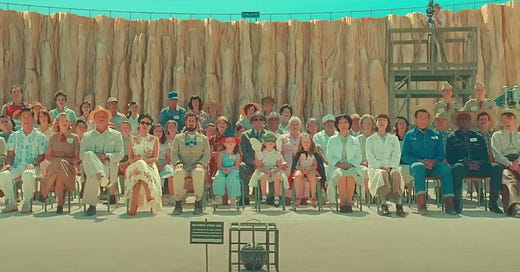



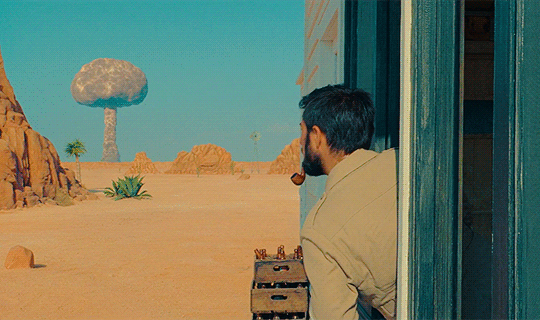
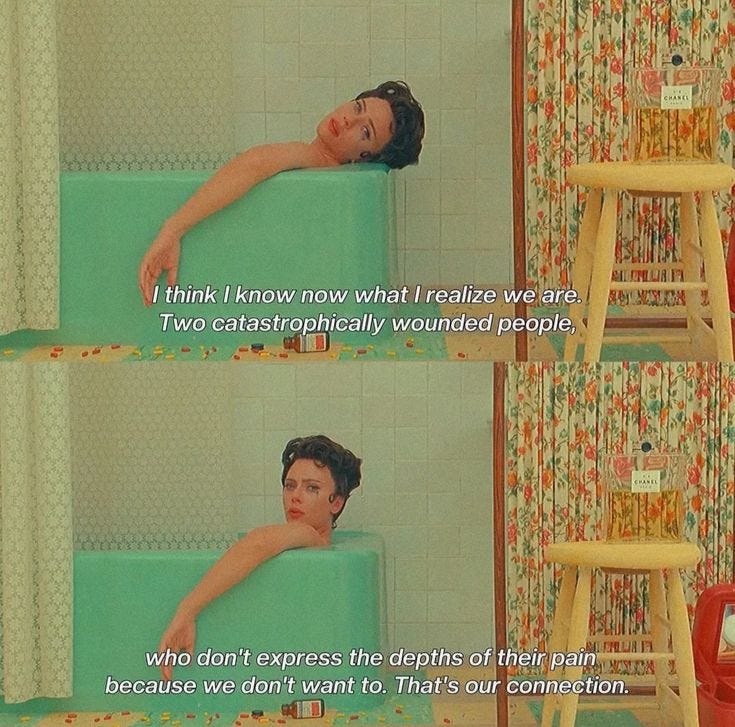
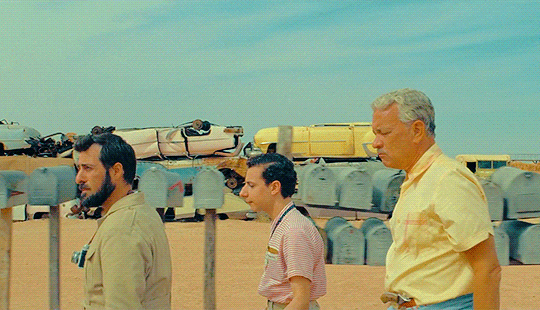
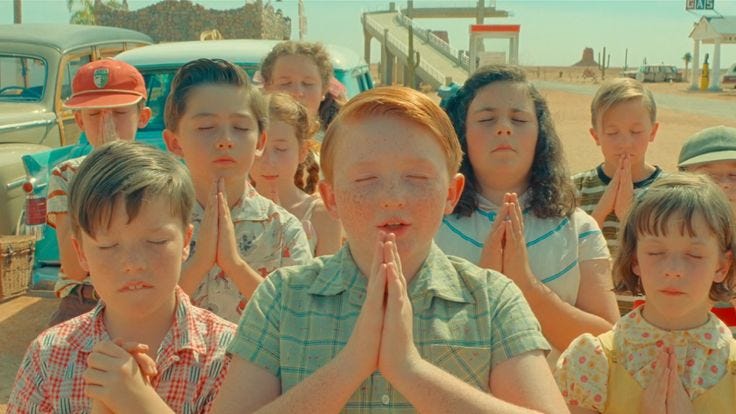
i always feel like people undercut the beauty, both technically and in storytelling, of asteroid city. it came out the summer after my mom passed, and it felt so intrinsically about grief that really affected me. i was so touched & loved the read!
What a great piece!! I went to see this in theaters with my dad when it came out having only seen Budapest, Fantastic Mr. Fox, and Moonrise Kingdom by Wes, and I was a little underwhelmed with the film. However, this article has really put into perspective what’s so important about the movie and has helped me get a lot more out of it!!It’s so cool to see that this could have so much of an impact on someone even though it didn’t work for me, and I love how passionate you are about it!! This has made me want to rewatch it! Great piece!!